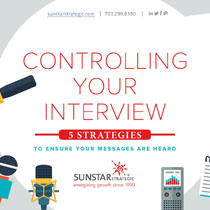All too often we hear about media opportunities that were lost or turned away because on the surface they seemed they might not be exactly the right fit.
It's a challenge for many in the industry. We received the following inquiry:
Question: I run a midsized fund family in the mid-west. We get our share of interview requests from the media. But our problem is we seem to "politely decline" a majority of those requests because the subject matter either is not relevant or our spokespeople don't have time. I believe we should take these interviews, but I feel alone. Your help is appreciated. Head of distribution, midwest bank fund family.
Answer: This is an issue that many fund firms struggle with.
Working relationships with the media can provide a forum for you to talk about your strategy, how you are positioning your portfolio, beliefs on the market, proof that your experts are thought leaders, among other things. You can also use the resulting articles to add credibility in your other sales and marketing efforts.
Reporters calling you can be an important piece to an overall PR program. But in this case, it appears a reactive media relations process may be part of our problem. Reporters are coming to you because they know you, saw your fund in a performance chart, or that you own a stock in the news. The reporter likely already has a story in mind and will either get a quote from you or someone else.
If you continue to decline requests, that reporter will likely stop coming to you for information.
An important goal with the media is to build relationships with the right reporters at the right publications. They may or may not quote you now, but they will learn what you stand for so you can be included the next time they come to your with a more relevant story.
Three solutions:
First. You can alleviate this issue or balance your media program by adding a proactive component to your public relations program. Have someone initiate more relevant interviews for your experts. Call on key reporters who cover mutual funds and investing and pitch how your story relates to the news. Some will be interested. Others won't. But continue to provide good ideas and you will get your share of coverage that is more on message. Just be sure your portfolio managers are aware, or even help you craft the pitch, and will be part of an interview if you get a good one. It would be a shame to generate some interest and have your expert turn that down too.
Second. Make sure you have commitment from the top and the portfolio managers understand working with the media is part of their job description. We know your portfolio manager's number one job is to manage the portfolios. We also know how busy they are. But if someone with authority isn't reinforcing the fact that the firm's public awareness and visibility is also a priority, then you are missing out on third-party endorsements that can attract investors and strengthen distribution.
Third. Better position the interview subject matter request for your portfolio managers so they say "yes." For example, I wouldn't expect a true bottom-up manager to comment about what the Federal Reserve will do over the next few months. But if the manager uses macroeconomic analysis in part of strategy, the issue should be fair game. And to almost guarantee your spokesman makes the time - I know in our industry we can't make guarantees - let him know the reporter wants to talk about how activities in the Federal Reserve will impact his portfolio and how he's positioning it. Even though the reporter didn't use this language in the request, positioning the topic this way will allow the portfolio manager to weave in his messages that he can't resist talking about.
Once you've got the interview scheduled, check out these great tips to take control of the interview.


